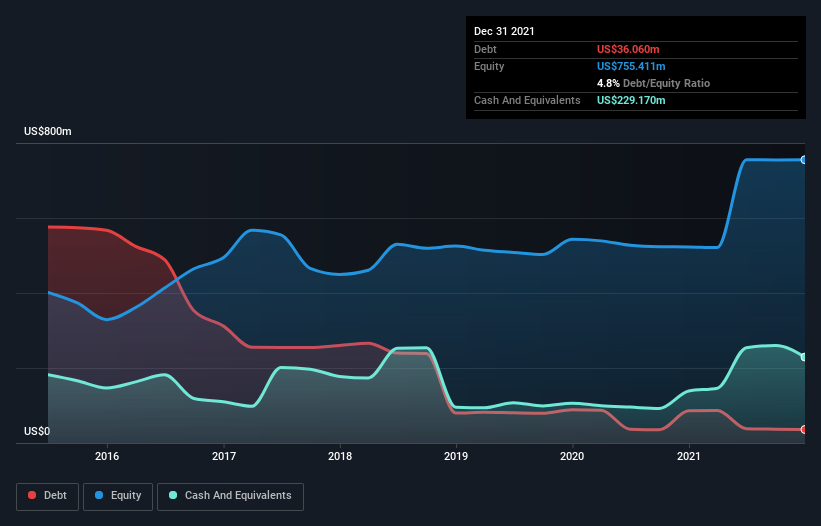- United States
- /
- Oil and Gas
- /
- NasdaqGS:CLNE
Does Clean Energy Fuels (NASDAQ:CLNE) Have A Healthy Balance Sheet?

Legendary fund manager Li Lu (who Charlie Munger backed) once said, 'The biggest investment risk is not the volatility of prices, but whether you will suffer a permanent loss of capital.' So it seems the smart money knows that debt - which is usually involved in bankruptcies - is a very important factor, when you assess how risky a company is. Importantly, Clean Energy Fuels Corp. (NASDAQ:CLNE) does carry debt. But should shareholders be worried about its use of debt?
Why Does Debt Bring Risk?
Debt is a tool to help businesses grow, but if a business is incapable of paying off its lenders, then it exists at their mercy. Ultimately, if the company can't fulfill its legal obligations to repay debt, shareholders could walk away with nothing. However, a more usual (but still expensive) situation is where a company must dilute shareholders at a cheap share price simply to get debt under control. Of course, the upside of debt is that it often represents cheap capital, especially when it replaces dilution in a company with the ability to reinvest at high rates of return. The first step when considering a company's debt levels is to consider its cash and debt together.
View our latest analysis for Clean Energy Fuels
What Is Clean Energy Fuels's Net Debt?
You can click the graphic below for the historical numbers, but it shows that Clean Energy Fuels had US$36.1m of debt in December 2021, down from US$85.7m, one year before. However, its balance sheet shows it holds US$229.2m in cash, so it actually has US$193.1m net cash.

A Look At Clean Energy Fuels' Liabilities
According to the last reported balance sheet, Clean Energy Fuels had liabilities of US$125.9m due within 12 months, and liabilities of US$75.8m due beyond 12 months. Offsetting this, it had US$229.2m in cash and US$112.8m in receivables that were due within 12 months. So it actually has US$140.4m more liquid assets than total liabilities.
This short term liquidity is a sign that Clean Energy Fuels could probably pay off its debt with ease, as its balance sheet is far from stretched. Succinctly put, Clean Energy Fuels boasts net cash, so it's fair to say it does not have a heavy debt load! The balance sheet is clearly the area to focus on when you are analysing debt. But it is future earnings, more than anything, that will determine Clean Energy Fuels's ability to maintain a healthy balance sheet going forward. So if you're focused on the future you can check out this free report showing analyst profit forecasts.
Over 12 months, Clean Energy Fuels made a loss at the EBIT level, and saw its revenue drop to US$256m, which is a fall of 12%. We would much prefer see growth.
So How Risky Is Clean Energy Fuels?
While Clean Energy Fuels lost money on an earnings before interest and tax (EBIT) level, it actually generated positive free cash flow US$12m. So taking that on face value, and considering the net cash situation, we don't think that the stock is too risky in the near term. We'll feel more comfortable with the stock once EBIT is positive, given the lacklustre revenue growth. When analysing debt levels, the balance sheet is the obvious place to start. However, not all investment risk resides within the balance sheet - far from it. To that end, you should be aware of the 2 warning signs we've spotted with Clean Energy Fuels .
When all is said and done, sometimes its easier to focus on companies that don't even need debt. Readers can access a list of growth stocks with zero net debt 100% free, right now.
New: AI Stock Screener & Alerts
Our new AI Stock Screener scans the market every day to uncover opportunities.
• Dividend Powerhouses (3%+ Yield)
• Undervalued Small Caps with Insider Buying
• High growth Tech and AI Companies
Or build your own from over 50 metrics.
Have feedback on this article? Concerned about the content? Get in touch with us directly. Alternatively, email editorial-team (at) simplywallst.com.
This article by Simply Wall St is general in nature. We provide commentary based on historical data and analyst forecasts only using an unbiased methodology and our articles are not intended to be financial advice. It does not constitute a recommendation to buy or sell any stock, and does not take account of your objectives, or your financial situation. We aim to bring you long-term focused analysis driven by fundamental data. Note that our analysis may not factor in the latest price-sensitive company announcements or qualitative material. Simply Wall St has no position in any stocks mentioned.
About NasdaqGS:CLNE
Clean Energy Fuels
Provides natural gas as alternative fuels for vehicle fleets and related fueling solutions in the United States and Canada.
Reasonable growth potential with adequate balance sheet.


